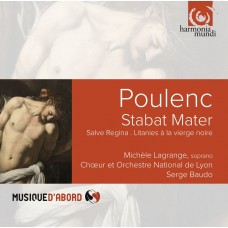|
"Now that the work is available with a chorus of more polished technique and far more reliable chording, one which uses its
words expressively and whose dynamic range is well served by the engineers, it makes an infinitely more telling
effect...Michele Lagrange brings tenderness-if not quite matching Regine Crespin's melting quality on the Pretre recording-to
the solo part...
It was to the black Virgin of Rocamadour, to whom Poulenc commended Berard's soul, that he had earlier addressed the
Litanies he had written on hearing of the death in a car crash of his friend Ferroud (a much neglected composer). This is an
altogether starker work, its austere choral writing punctuated by powerfully pungent chords until peace is gradually found
towards the end... this too is well sung and played."
Gramophone, July 1985
"Comparison with the 1984 recording for Harmonia Mundi (HMC905149), conducted by Serge Baudo, shows that there is
another, better way with this music... Baudo's soprano, Michèle Lagrange. She sings with a calmness and with a simple
authority... If you want a recording of the Poulenc Stabat Mater... the Baudo recording offers a better alternative."
Stabat Mater: 1 I. Stabat Mater dolorosa | 2 II. Cujus animam gementem | 3 III. O quam tristis et afflicta
4 IV. Quae moerebat et dolebat | 5 V. Quis est homo, qui non fleret | 6 VI. Vidit suum dulcem natum
7 VII. Eja Mater, fons amoris | 8 VIII. Fac ut ardeat cor meum | 9 IX. Sancta Mater, istud agas
10 X. Fac ut portem Christi mortem | 11 XI. Inflammatus et accensus | 12 XII. Quando corpus morietur
13 Salve Regina
14 Litanies à la vierge noire |
|


